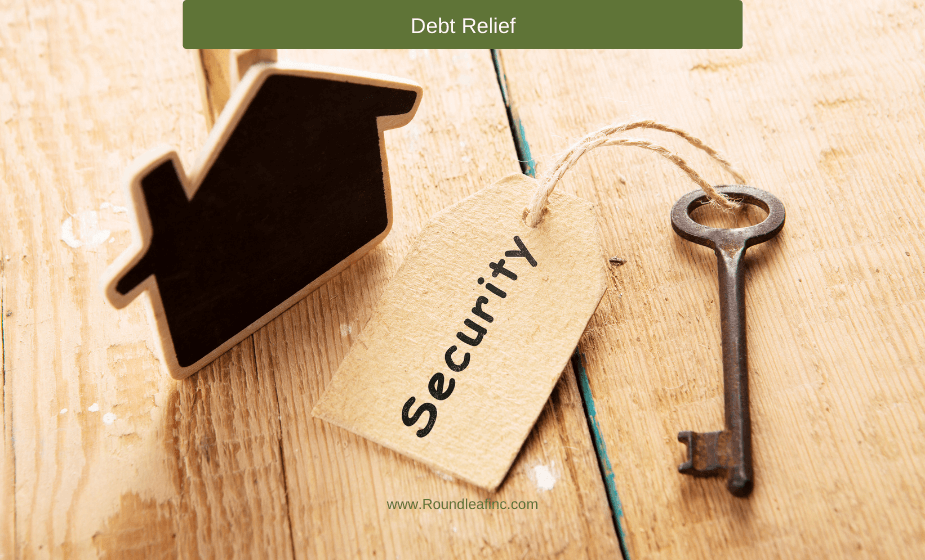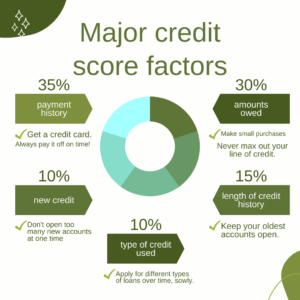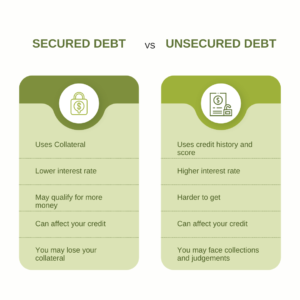Unsecured Debt Vs Secured Debt

Unsecured Debt Vs Secured Debt – What is the difference?
Secured or Unsecured? Whether you are looking to open a first-time credit card or an additional credit card the one main question is what’s the difference? It is important to understand everything about the different types of debt before opening a credit card. No one knows your financial situation better than you, so let’s help you make the right decision.
What is unsecured debt?
Unsecured debt is any loan that is not protected by collateral. A type of unsecured debt includes credit cards, medical bills, utility bills, personal loans, student loans, and anything else that does not require collateral. Unsecured loans are typically riskier for lenders than secured loans which are why they often come with a higher interest rate.
In order to qualify for an unsecured loan, most lenders look at your credit history and credit score. The higher your score and the better your credit history is the more likely the lender will give you the loan. Unsecured loans are riskier for lenders because they are taking your word for paying them back. Your credit history and credit score are how they can determine if your word is good enough for them to give you the loan.
Credit history/score factors
There are several factors that impact your credit history and credit score. Payment history is the most weighted factor (35%) in determining your credit score. Even one late payment can hurt it badly. When you make a payment on time, it is recorded in your credit history, and that is how your score is built up.
The following factors include:
- Credit utilization ratio (30%)
- Length of your credit history (15%)
- Current credit portfolio mix (10%),
- The number of newly opened credit accounts (10%) and hard inquiries connected to them.
- Foreclosures, bankruptcy, repossession, charge-offs, and settled accounts can also negatively impact your credit score.

Defaulting on an unsecured loan
Defaulting on any type of loan will negatively affect your credit. While you may not lose any of your assets if you fail to pay back your unsecured loan, falling into default can significantly lower your credit. Falling into default will not only lower your credit score, but it will remain negative on your credit report for seven years.
Typically if you are 30 days late or more in paying back your loan, the lender will either sell your debt to collections or decide to take legal action against you. Either way, you will be facing serious consequences for failing to pay off your loan and may not be able to get another one in the future.
What is secured debt?
A secured loan is the opposite of an unsecured loan. In order to qualify for a secured loan, your lender must have collateral as a form of security. Examples of secured loans include car loans, mortgages, secured credit cards, secured personal loans, etc. If you fail to pay back your loan, the lender can take ownership of your collateral to help pay off your debt.
For example, when you apply for an auto loan, you are putting the new car up as your collateral. You do not actually own the car which means that if you fail to pay back the auto loan, the lender will repossess the car from you. Typically they will sell the car and put that money towards what you owe them. Unfortunately, when this happens they usually do not sell it for the whole amount and you may still owe them.
This is the same concept for any other secured loan. This type of loan is considered less risky and may come with a lower interest rate.
Defaulting on a secured loan
Like anything else, if you pay back your debt nothing bad happens. However, like unsecured loans, if you fall into default in a secured loan your lender has the right to come after you for the debt you owe. In this case, the lender can seize or take ownership of the collateral.
This is why it is very important to fully understand what you are agreeing to before signing any documents. Make sure you are aware of this agreement and what your collateral is. Typically if you are just a few days late, you may only need to pay a late fee, but make sure you know how many days they give you before it becomes default.
Defaulting on a secured loan impacts your credit the same way that it would if it were an unsecured loan. It has a negative impact on your credit score and can last for up to seven years. This may also affect you’re getting future loans.
Unsecured of Secured: What’s the difference?
There are several differences between unsecured and secured debt. It is important to review all of the information to make the right decision for you and your financial situation.
 What to know when considering debt relief
What to know when considering debt relief
If you have loan debt that has fallen into delinquency, you are not alone. There are many debt relief options available to you and your situation. Let’s discuss those options and how they may help you become debt-free!
Debt Management
A debt management plan is an agreement with creditors to repay debts over a more extended period. This is not debt consolidation or debt settlement. There is also no legal obligation to a debt management plan.
The purpose of a debt management plan is to help you pay off your debt in a timely manner to become debt-free. Your debt payments are regularized through an organized channel. A debt management plan can help you improve your credit score.
A debt management plan is best suited for individuals with high-interest rates and unsecured debts. Secured debt does not usually qualify for a debt management plan.
Debt Consolidation
Debt consolidation is the act of combining all your debt into one loan with a lower monthly payment. This option gives you the chance to reduce your monthly payments, lower your interest rate, and focus on paying one debt instead of multiple debts at once.
Debt consolidation helps you pay off your debt faster by combining them into one. This gives you the chance to keep up with one payment. This is easier for some people who have multiple debts and have a hard time keeping up with them.
To qualify for a debt consolidation loan you typically have to have a good credit score. Other qualifications include job history, income, education, and payment history. Most unsecured debts are eligible for debt consolidation.
Most common debt eligible include:
- Student loans
- Credit card debt
- Medical bills
- Home equity loans
- Delinquent utility bills
Speak to a financial expert to find out if you qualify!
Debt Settlement
Debt settlement is different from debt management and debt consolidation. Debt settlement is a practice that includes negotiating your current debt amount for a lesser amount. This debt relief option helps people avoid bankruptcy, stop the harassing phone calls and emails, and pay off their debt faster.
While you can settle your debt on your own, most people pay an expert to do it for them. There are important things to consider when thinking about debt settlement.
Risks
When considering debt settlement, you must understand that you will most likely have to pay the settled amount in a lump sum. This can be hard for some people. However, this is cheaper in the long run because you are saving from interest charges and lowering your regular debt amount.
Another risk to consider is that at the end of it all, your creditor could refuse the settlement. Creditors are not obligated to settle the debt amount.
Benefits
While there are many risks associated with debt settlement, there are also some benefits that may outweigh the risks.
- Stops debt collection calls
- Reduces overall interest rates through debt reduction
- Helps increase credit score
- Lowers your monthly payment
- Reduces or eliminates finance charges
- Approximately determines a goal when you will be debt-free
- Helps avoid bankruptcy
- Offers credit counseling
- You do not have to do the debt negotiation
Speak to a debt relief expert to see your options!

 What to know when considering debt relief
What to know when considering debt relief